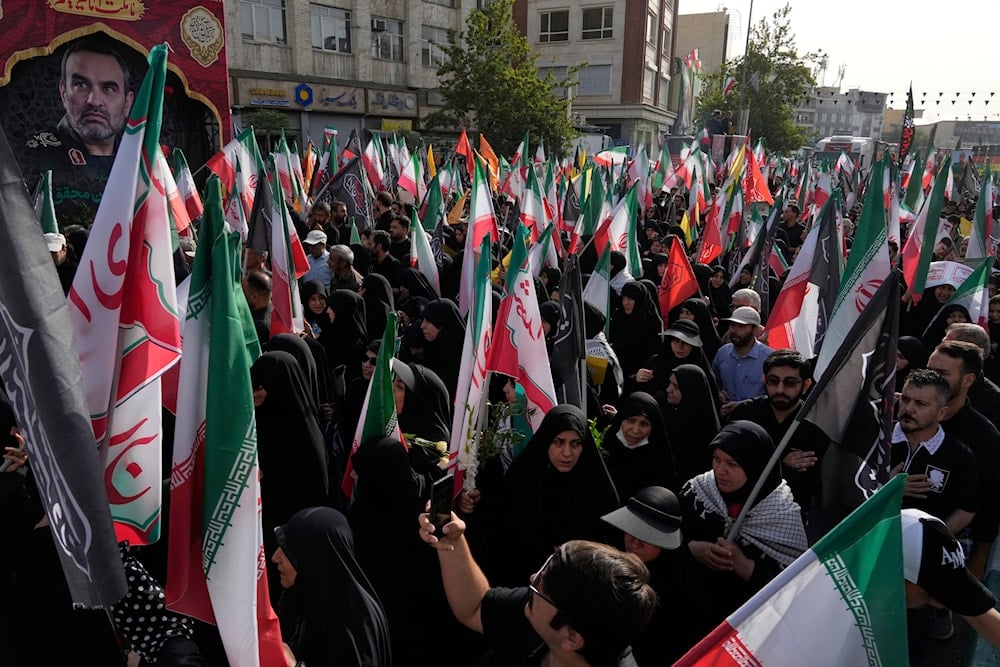Iran denies claims of Russian offer to halt enrichment: Sources
Iran reaffirms its right to a peaceful nuclear program amid ongoing talks between Moscow and Tehran.
-

Carrying Iranian flags, mourners attend the funeral ceremony of the Iranian Armed Forces generals, nuclear scientists, and their family members who were killed in Israeli strikes, in Tehran, Iran, Saturday, June 28, 2025 (AP)
Iran remains adamant about enriching uranium on Iranian soil, asserting that Russia holds the same position regarding Iran's nuclear program, diplomatic sources affirmed to Al Mayadeen.
Commenting on circulated reports, diplomatic sources denied to Al Mayadeen that Iran has received any Russian proposal to halt uranium enrichment on its territory.
The sources highlighted that Russia’s stance regarding Iran’s right to peaceful uranium enrichment has not shifted amid the current discussions between the two nations, adding that before the Israeli aggression, Russia had backed a proposal in the talks between Tehran and Washington, which suggested moving enriched uranium to Russian territory.
They clarified that the proposal involved transferring uranium enriched beyond 3.67% from Iran to Russia as part of efforts to reach an agreement at the time.
However, the sources emphasized that Iran will not agree to any initiative that does not guarantee its legitimate right to enrich uranium inside its territory within the framework of a peaceful nuclear program.
This shortly follows signals by Iran that it remains willing to take the diplomatic route regarding its nuclear program, after the Israeli-US aggression on Iran derailed already ongoing talks to reach a deal.
Iran open to talks, demands guarantees: Araghchi
Iranian Foreign Minister Abbas Araghchi stated on July 10 that Tehran was still willing to reengage in nuclear talks with the US, but only if Washington provides firm guarantees against military action, commits to mutual respect, and acknowledges its past policy mistakes.
“We must first receive guarantees that Washington will not resort to military action during the negotiations,” Araghchi said during an interview for the French Le Monde publication, emphasizing that diplomatic patience is essential when considering historical evidence.
Araghchi addressed the collapse of US-Iran diplomacy, attributing it to the "maximum pressure" policy initiated during Donald Trump's first presidential term, which he described as marked by mixed signals, alternating between offers for dialogue and escalatory threats alongside punitive actions.
Araghchi explained that while Iran had rejected direct talks with the US, it had engaged in indirect ones under modified conditions, emphasizing that these past interactions demonstrate why Tehran remains wary and demands fundamental shifts in Washington's diplomatic approach toward Iran.
Iran says trust in US broken
Iranian officials confirmed on Tuesday that the United States has conveyed messages expressing interest in resuming nuclear negotiations, but skepticism over Washington’s intentions continues to cloud prospects for renewed diplomacy.
Saeed Khatibzadeh, Assistant to Iran's Foreign Minister, said that Tehran had received several indirect messages from the US in recent days indicating a desire to return to the negotiating table. However, he stressed that meaningful talks require a basic level of trust, something he argued has been undermined by recent hostile actions.
"Negotiations require a minimum level of trust, and the blatant aggression against Iran has practically left no room for it," Khatibzadeh said, referencing what Tehran describes as a US assault on its nuclear facilities. He further noted that Iran was "in the middle of negotiations" when the attack occurred, adding, "We were also in talks with the Europeans at the time of the American strike."
Despite this, he reaffirmed that diplomacy has "always been the fundamental principle" of Iran’s foreign policy.
According to Iranian news agency Mehr, a well-informed source stated that the United States, through mediators from several countries, had sent a formal request to Iran to resume discussions concerning its nuclear program.

 4 Min Read
4 Min Read










